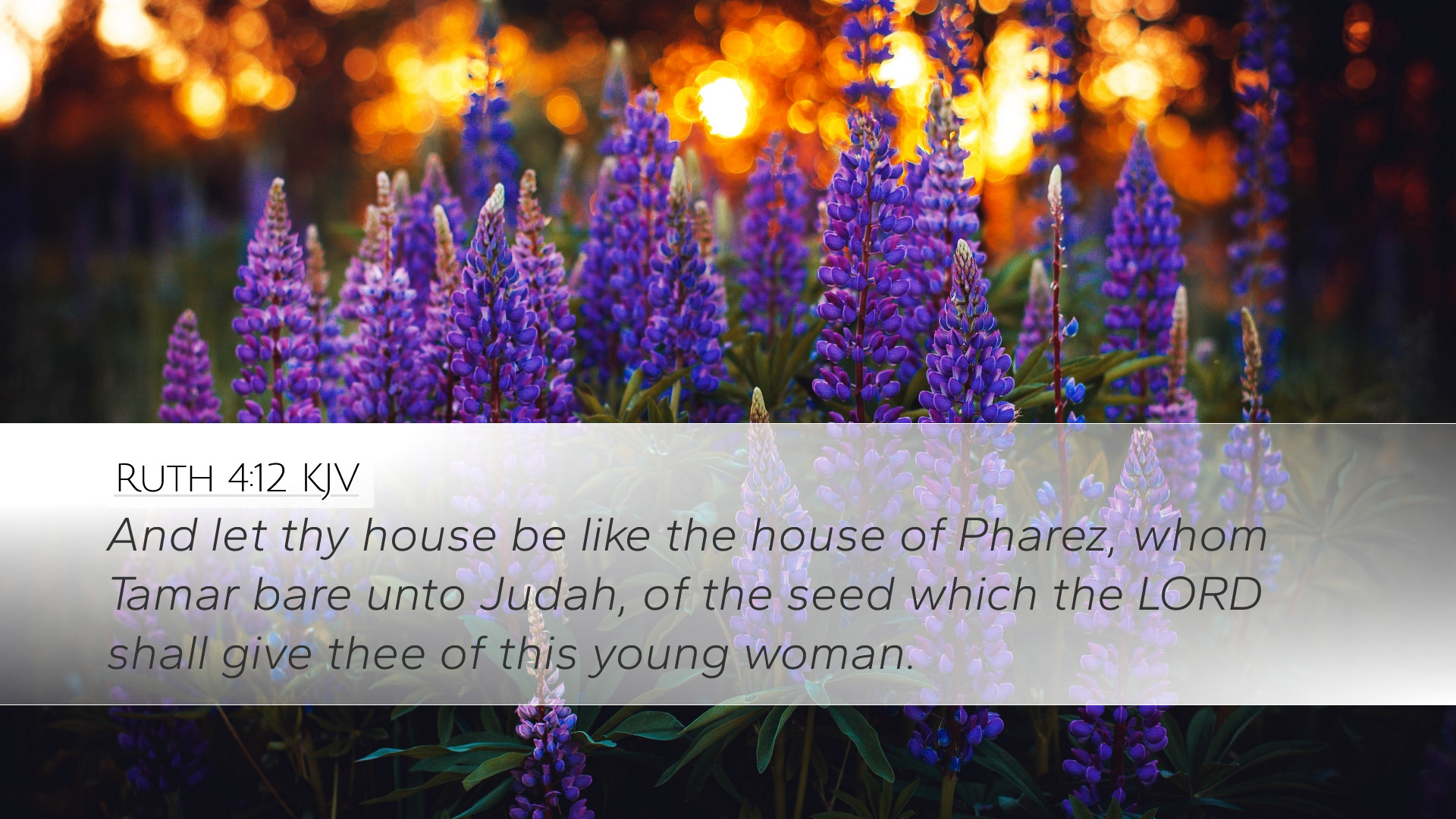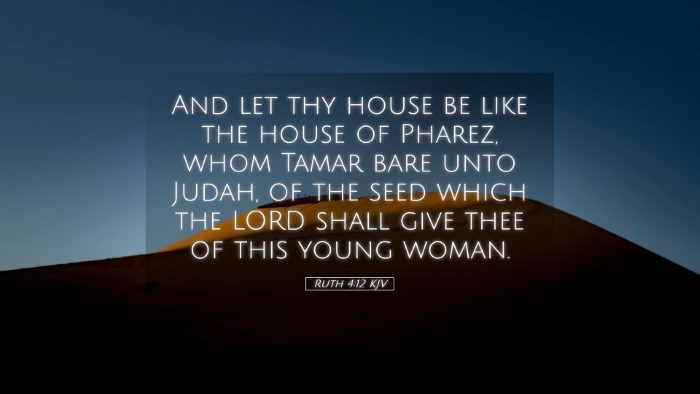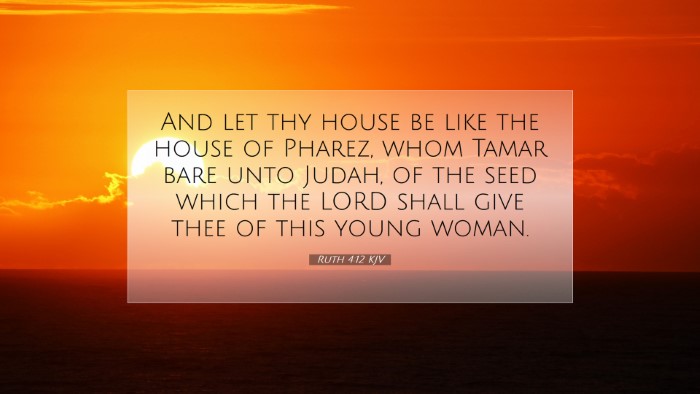Old Testament
Genesis Exodus Leviticus Numbers Deuteronomy Joshua Judges Ruth 1 Samuel 2 Samuel 1 Kings 2 Kings 1 Chronicles 2 Chronicles Ezra Nehemiah Esther Job Psalms Proverbs Ecclesiastes Song of Solomon Isaiah Jeremiah Lamentations Ezekiel Daniel Hosea Joel Amos Obadiah Jonah Micah Nahum Habakkuk Zephaniah Haggai Zechariah MalachiRuth 4:12
Ruth 4:12 KJV
And let thy house be like the house of Pharez, whom Tamar bare unto Judah, of the seed which the LORD shall give thee of this young woman.
Ruth 4:12 Bible Commentary
Commentary on Ruth 4:12
Ruth 4:12 states: "And may your house be like the house of Perez, whom Tamar bore to Judah, because of the offspring that the Lord will give you by this young woman." This verse provides a blessing that carries profound significance, rich with theological and historical implications. In this commentary, we will explore insights drawn from public domain sources, particularly from Matthew Henry, Albert Barnes, and Adam Clarke, providing depth and meaning that serve pastors, students, theologians, and Bible scholars alike.
Contextual Background
To fully appreciate the weight of Ruth 4:12, it is essential to consider the narrative context. The book of Ruth illustrates the themes of loyalty, divine providence, and redemption. Ruth, a Moabite widow, chooses to stay with her Israelite mother-in-law, Naomi, and ultimately becomes part of the lineage of David. The significance of Perez, mentioned in this verse, links Ruth's redemption and the continuation of God's plan through seeming ordinary means.
Insights from Matthew Henry
Matthew Henry emphasizes the divine blessing within this passage. He notes that the mention of Perez signifies a noteworthy lineage—the choice of Tamar to bear children by Judah aligns with God's overarching redemptive plan. Henry asserts that Boaz's blessing reflects not only hope for fruitful descendants but also acknowledges the importance of God's providence in their lives.
Henry suggests that the blessing serves to establish a covenant relationship within Israel. The reference to Perez, the son of Judah, highlights God’s faithfulness in using unexpected means, such as Tamar's actions, to ensure the continuation of the line leading to the Messiah. This principle reverberates with the idea that God's plans are realized through flawed humanity, demonstrating divine grace.
Insights from Albert Barnes
Albert Barnes reflects on the historical significance of Perez and his lineage. In his commentary, he posits that Ruth’s integration into the Israelite community represents a broadening of God's promises. Perez, being part of the lineage through which David—and ultimately Christ—emerged, symbolizes the breaking of ethnic barriers. Barnes argues that this prophecy hints at God's larger plan for inclusivity and the depth of His mercy.
Barnes points out that Boaz's blessing anticipates not only Ruth’s immediate contribution to his household but also the broader implications for Israel’s future. The language used implies fruitfulness and strength that will come through Ruth’s union with Boaz. Barnes asserts that this serves to demonstrate that God's favor can be bestowed upon those outside the covenant community when they embrace His people in faith and loyalty.
Insights from Adam Clarke
Adam Clarke’s exposition further deepens the understanding of Ruth 4:12 by examining the cultural implications of the blessing. Clarke notes the strategic nature of invoking Perez’s name: it signifies a blessing that is rich in heritage and lineage, praying that Ruth’s house might parallel this esteemed lineage. He underscores that this blessing emphasizes the preservation of family and legacy, critical elements of ancient Near Eastern culture.
Clarke elaborates on the significance of invoking God's action in terms of fruitfulness. The phrase "that the Lord will give you" underlines the dependence on divine provision and highlights God's active role in blessing faithfulness. Clarke also stresses the continuity between past generations and the present, suggesting that the prayer acknowledges God's ongoing work among His people throughout history.
Theological Implications
All three commentators converge on the central theme of redemption that runs through Ruth 4:12. This passage encapsulates the hope and promise not just for Ruth and Boaz but reflects a broader divine narrative—the integration of Gentiles into God’s redemptive plan.
The mention of Perez serves to remind readers that God's plan can unfold in unexpected ways, often through human actions that seem insignificant. The expectation of divine blessing on Boaz and Ruth reinforces the notion of God’s sovereignty in orchestrating events for His purposes. Their story serves as a prelude to the New Testament, where Jesus’ lineage includes both Jews and Gentiles, embodying the fulfillment of God's promise to all nations.
Conclusion
In summary, Ruth 4:12 conveys a profound blessing steeped in invitation, promise, and hope. The insights of Matthew Henry, Albert Barnes, and Adam Clarke enrich our understanding of this text, inviting theologians and students to reflect on the nature of God’s workings in human history. For pastors and scholars, Ruth 4:12 is not merely a historical comment but a profound reminder of God's graciousness in expanding His covenant to include all who demonstrate faithfulness and loyalty. This verse calls us to view our lives within the framework of God’s redemptive history, encouraging us to trust in His provision and the unfolding of His plan.


